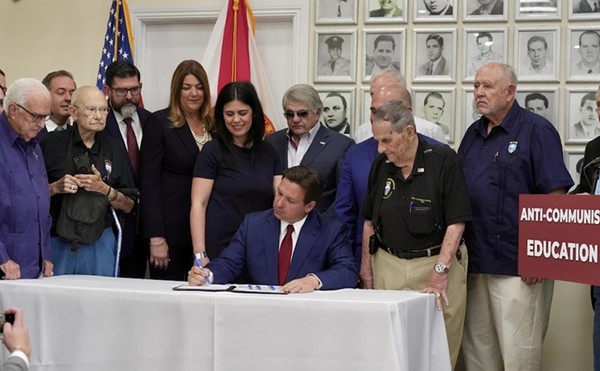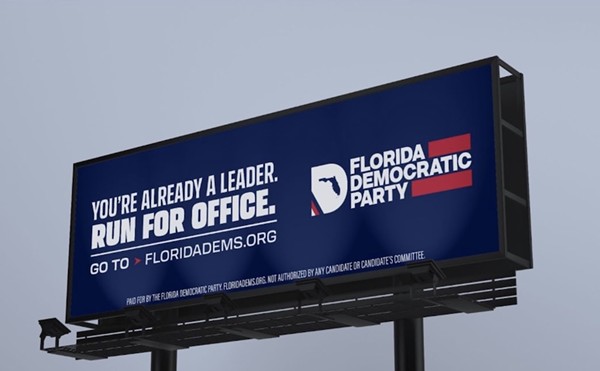The law, in its majestic equality, forbids the rich, as well as the poor, to sleep under the bridges, to beg in the streets, and to steal bread.
-- French writer Anatole France (1844-1924)
In Orlando, actually, you can sleep under a bridge if you're rich. Just not if you're poor. Or, rather, only the poor will be arrested and taken to jail for it.
This according to the sworn statements of several city police officers and of city prosecutor Ken Hebert, in a lawsuit filed by a homeless man against the city's camping ordinance, an ordinance that seeks to keep people moving by denying them the opportunity to rest.
James Joel was arrested twice within a few days late last February and early March. He pleaded guilty to the first arrest and was released with "time served," his overnight jail stay. That's the way the vast majority of these cases work.
Joel is a former truck driver who suffers from depression. When he was arrested the second time, his feet also were swollen. He says he tried to get a ride from the 33rd Street jail back downtown, but was told to hit the road. He walked the eight miles.
Joel sat on a bench at Church Street Station after walking for five hours, but was warned to move on. It was a cold day and getting dark, so Joel walked until he found a steel grate through which some heat was rising. He lay down and fell asleep.
At 7:45 p.m. Joel was busted for "camping" on the steal grate next to a building at Magnolia Avenue and Wall Street Plaza. The arresting officer, Steve Brunton, said Joel was camping because he used a plastic shopping bag with some clothes in it as a pillow.
Joel pleaded not guilty and spent 12 days in jail. When his case came up, the city dropped the charges.
Joel's attorney, Steve Mason, who filed the lawsuit on Joel's behalf on March 15, says the law is applied only to the homeless, in violation of their constitutional rights. He took Joel's case, which is being financed by the American Civil Liberties Union, to get the city to rescind the law.
The law was passed decades ago. But you'd be forgiven if you thought it was a more recent invention, because it is so perfectly in keeping with a current unsettling pattern.
Orlando has for years searched for ways to control public space downtown in order to make the area more attractive to tourists. Those efforts have only intensified under Mayor Glenda Hood. From the anti-cruising ordinance to the teen curfew, from the anti-rave ordinance to the licensing system for panhandlers, city leaders have sent a message to the young, the poor and -- especially -- the homeless that they are not welcome downtown.
While the strategy has been somewhat effective in controlling the transient population, many members of which have moved out of the city and into shanties in the woods, the overall program has its downside, if only in the public-relations arena. The April 1998 issue of Harper's magazine included an annotated panhandler's permit from the city, which ran under the headline, "No place like home: Orlando's poor laws attempt to regulate the homeless away," and quoted an unnamed Orlando police sergeant. "We're actually hoping we'll displace people to other cities," he said.
The longstanding camping law says you can't pitch a tent in the park, can't sleep on the sidewalk or on other public property, and can't cook in public. The ordinance makes specific reference to sleeping "within 10 feet of a railroad track."
The ordinance appears to prohibit sleeping in the park on a sunny afternoon, or dozing off on a bench. But city officials say it is enforced according to the "Most Used City Ordinance Book," or MUCOB, which is a set of guidelines for police. Previous court decisions have said the camping ordinance is constitutional -- "for true camping, not just sleeping," says Mason. "That's what promoted the city to write those notes. But the notes are actually more inflammatory than the law itself."
According to the MUCOB guidelines on the ordinance, sleeping is not in and of itself sufficient for an arrest. The person must have some kind of temporary living structure, like a tent, a sleeping bag, a box, a piece of cardboard on the ground, or a sheet of newspaper. This would seem to suggest that a stockbroker who shuts his eyes while browsing the Wall Street Journal would be in trouble. Indeed, some arrests -- including Joel's -- were based on less than that.
That's because the notes say police can arrest someone if "the suspect is asleep and when awakened volunteers that he has no other place to live. Homeless persons should additional`ly` be advised of alternative shelter available at the Coalition for the Homeless."
Police depositions in the case, and an analysis by University of Central Florida psychology professor Randy Fisher of 243 of the 1,136 camping arrests that occurred between January 1995 and November 1997, show the law is applied to the homeless almost exclusively. As city prosecutor Hebert put it, "These people who are transients or homeless are ... using this `street` as a living facility; therefore, in violation of the ordinance. That doesn't mean the ordinance is discriminately applied against them. ... I suspect if the Boy Scouts went out there as often as a homeless person and used this for camping, that the Boy Scouts would get arrested as many times."
But there were no arrests of Boy Scouts, nor any of stock brokers. It is possible that every person charged under the camping ordinance in Orlando since 1995 has been homeless, according to Fisher's analysis.
Both the plaintiff and the city have requested a court ruling without a trial in the case, saying they have stated their facts. The city says the law is applied to all equally. The ordinance, argues city attorney Scott Gabrielson, supports a "common-sense understanding of camping ... a prohibition that has been found supportable by the United States Supreme Court."
So how "common sense" is this definition, as applied by Orlando police? Not very, as illustrated by the following excerpts from their depositions, and the deposition of Hebert, who prosecutes on behalf of the city and trains the police in legal interpretation of the ordinance.
Officer Angel Rodriguez has made at least 100 arrests under the camping ordinance, and arrested Joel for camping on Feb. 28, 1998. He was questioned in the deposition by Mason:
Q: If a person is sleeping in a public place and they volunteer that they are homeless and have no place to go, does that constitute camping?
Rodriguez: As far as I understand the city ordinance, yes.
Q: How about if they're sleeping in a public place and they tell you, I have a home. I just had too many drinks and fell asleep here. And they are not homeless. Do you believe that they would be subject to arrest?
A: As I understand the ordinance, I would think not. Especially if they can prove that they have a legitimate home address.
Officer Charles Hengehold testified that citizen complaints about a homeless person's "annoying" odor is "something we have to deal with as a police department":
Q: So if a businessman was stressed out dealing with crazy civil litigation, goes over to the park and falls asleep on the bench for 30 minutes, he won't be arrested?
Hengehold: No, sir.
Q: How about if he is leaning on his briefcase, snoozing?
A: No, sir.
A: No, sir.
Q: How about if he volunteers that his wife just kicked him out and he has no place to go?
A: No, sir.
A: No, sir.
Former Police Chief William Kennedy added: "`T`he most important thing would be what the individual tells you about why they are sleeping out of doors."
But enforcement goes farther than that. According to Officer Brunton, who arrested Joel on March 2, 1998, a homeless person need not even be asleep to be arrested for camping, if they have something -- a piece of cardboard, some newspapers or a jacket -- on which they are merely resting.
Concludes Mason: "If you close your eyes for 30 seconds and a cop comes along and states he has so-called independent evidence that you are homeless, you go to jail."
This may not be as much of an exaggeration as it sounds. Mason refers in the Joel case to the fate of another one of his clients, Kenneth Smith, a homeless amputee. According to Mason, Smith sat down in Wall Street Plaza at 11:30 one morning, and when he closed his eyes and leaned against his duffel bag, he was arrested and put in jail.
Orlando is not alone in its struggle to control its homeless population without running afoul of the Constitution. In Miami, homeless people last year won a $1 million legal settlement after a 10-year battle against a camping ordinance. The city lost because it offered no shelter where the homeless were supposed to sleep. Miami now has such a place, and the new law is similar to Orlando's: homeless people can't sleep in the streets because the city provides a shelter.
Joel argues that the $1 nightly fee charged by the Coalition for the Homeless is sometimes a barrier, but more often he simply chooses to stay outside because it's more comfortable there.
At the shelter, "I have to get up at 5 a.m.," says Joel. "Sometimes a guy comes up, lays next to me, and starts saying things. I mean, I know they're sick people. ... One time a guy couldn't make it to the bathroom and he peed all over where I was laying."
City attorney Gabrielson has overseen Orlando's response to the Joel case. Bottom line, he says, the ordinance is defensible as enforced: "If options exist for a homeless person, and the community has provided facilities, then the city is within its rights to say you can't camp out in our cities."
"To me," he adds, "the philosophical, political issue is, is it appropriate for government to steer folks like Mr. Joel toward a network of services that can help them? Libertarian people might have a problem with that, but I think on balance it does some good. I do think, at least statistically, the streets are not the safest place to spend the night."
James Joel disagrees. "I do all right. I eat good, I change clothes, I shower. Only problem is, I sometimes don't have the right coat on. I have a light coat." Nonetheless, "Except for being homeless," he says, "I'm not in bad shape."


















